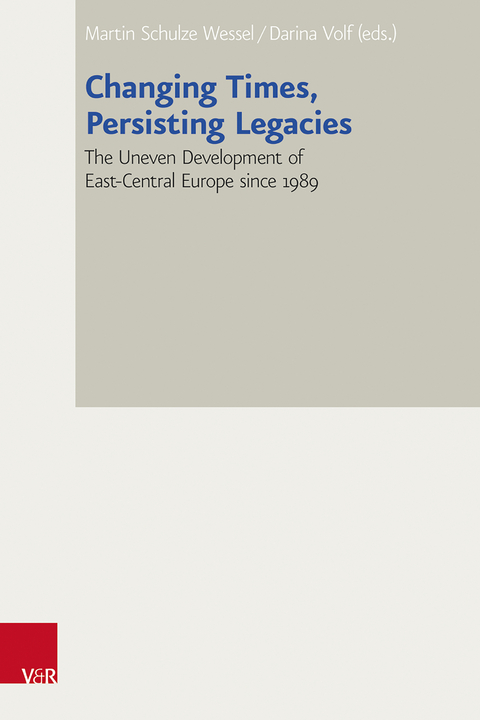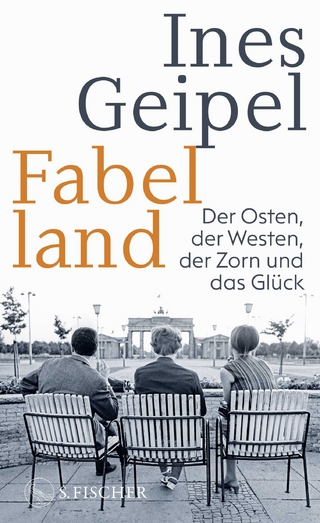
Changing Times, Persisting Legacies
The Uneven Development of East-Central Europe since 1989
Seiten
2024
Vandenhoeck & Ruprecht (Verlag)
978-3-525-30333-7 (ISBN)
Vandenhoeck & Ruprecht (Verlag)
978-3-525-30333-7 (ISBN)
- Noch nicht erschienen (ca. Dezember 2024)
- Versandkostenfrei innerhalb Deutschlands
- Auch auf Rechnung
- Verfügbarkeit in der Filiale vor Ort prüfen
- Artikel merken
A look into the (pre-)socialist past to understand the divergent and asynchronous post-1989 transformations in East-Central Europe.
This volume aims to contribute to the historicization of the post-1989 transformation period in East-Central Europe by addressing the temporality of transformation from a predominantly historical perspective, but also in dialogue with the social sciences. It focuses on the four countries that form the core of East-Central Europe - Czechia, Slovakia, Poland, and Hungary - but broadens the perspective by including more general comparisons within the region as well as insightful case studies from other countries that share some important characteristics with the narrowly defined East-Central Europe, but that, at the same time are able to shed some light on certain specific features of each case. The divergent developments in East-Central Europe after 1989 are explained by investigating the prehistory of transformation in the East-Central European states and societies from various perspectives and for areas as diverse as politics, social affairs, law, economy, culture, and national identity.
This volume aims to contribute to the historicization of the post-1989 transformation period in East-Central Europe by addressing the temporality of transformation from a predominantly historical perspective, but also in dialogue with the social sciences. It focuses on the four countries that form the core of East-Central Europe - Czechia, Slovakia, Poland, and Hungary - but broadens the perspective by including more general comparisons within the region as well as insightful case studies from other countries that share some important characteristics with the narrowly defined East-Central Europe, but that, at the same time are able to shed some light on certain specific features of each case. The divergent developments in East-Central Europe after 1989 are explained by investigating the prehistory of transformation in the East-Central European states and societies from various perspectives and for areas as diverse as politics, social affairs, law, economy, culture, and national identity.
Martin Schulze Wessel ist Professor für die Geschichte Ost- und Südosteuropas an der Universität München und leitet das Collegium Carolinum.
Dr. Darina Volf ist wissenschaftliche Mitarbeiterin am Historischen Seminar der LMU München und am Collegium Carolinum, Forschungsinstitut für die Geschichte Tschechiens und der Slowakei, in München.
| Erscheint lt. Verlag | 9.12.2024 |
|---|---|
| Reihe/Serie | Bad Wiesseer Tagungen des Collegium Carolinum ; Band 043 |
| Verlagsort | Göttingen |
| Sprache | englisch |
| Maße | 160 x 235 mm |
| Gewicht | 446 g |
| Themenwelt | Geschichte ► Allgemeine Geschichte ► Zeitgeschichte |
| Geisteswissenschaften ► Geschichte ► Regional- / Ländergeschichte | |
| Schlagworte | East Central Europe • Legacies • Transformation |
| ISBN-10 | 3-525-30333-5 / 3525303335 |
| ISBN-13 | 978-3-525-30333-7 / 9783525303337 |
| Zustand | Neuware |
| Haben Sie eine Frage zum Produkt? |
Mehr entdecken
aus dem Bereich
aus dem Bereich
Gewalt, Umwelt, Identität, Methode
Buch | Softcover (2024)
Spector Books OHG (Verlag)
36,00 €
der Osten, der Westen, der Zorn und das Glück
Buch | Hardcover (2024)
S. Fischer (Verlag)
26,00 €
die Deutschen und ihre Demokratie seit den 1980er-Jahren
Buch | Hardcover (2023)
Siedler (Verlag)
28,00 €


